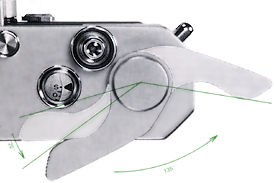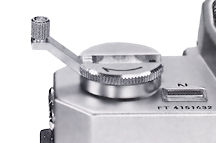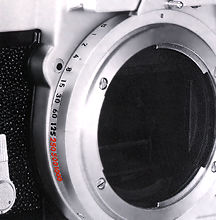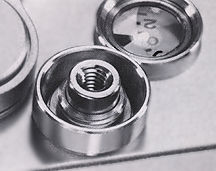The film advance lever has a winding angle of 135° with ample clearance of 20° (Most Nikon cameras fall between 135° to 140°, but the stand off position may varies, depend on models - just take a case study, the Nikon F3 (1980) has 140° and 30° standoff position) for the thumb, to enable quick advance to the next frame.
 |
In one sweep, it simultaneously winds the film, cocks the shutter and operates the frame counter, and springs back to its original position after each stroke. A built-in locking device prevents the shutter from being released before it is fully cocked and the film is advanced one full frame. The film advance lever also serves as an on/off switch for the exposure meter built in the finder. |
The meter is switched
off when the lever is pressed against the camera body and turned on when the lever
is moved out from its original position to reveal a red dot at the roof of the camera
body.
3. Frame Counter
 |
A circular window on the top left side of the camera body, the frame counter indicates the number of-frames exposed. Every other frame is numbered, from 0 to 36, and the magnifying glass (This very good feature was omitted on the compact series of FE/FM series) on the circular window ensures easy reading. The numerals 20 and 36, marked in red, correspond to the number of frames in standard film cartridges. The counter stops at 36, and resets itself to "S" - two frames before "0" - when the camera back is opened for reloading. |
4. Film Rewind Crank
 |
The film rewind crank is for smooth and rapid rewinding of film. It can be folded into the rewind knob when not in use. |
5. Film Plane Indicator
The position of the film plane in the camera body is indicated by the (~) mark on the top of the camera body. This is a useful feature in close-ups or macrophotography, for which the photographer is required to know the exact film-to-subject distance. Early days of the Nikon F models doesn't provide this symbol, instead you have to use the numeric serial number of the camera as a guide.
6. Shutter Speed Ring
 |
As a Modern Nikon camera user, the Nikkormat most un usual way of handling was the shutter speed and ASA/ISO adjustment. It works something like the current manual focus Oylmpus or the Medium format Hasselblad. Because it has no shutter speed dial on the top panel of the cmaera body, instead, the shutter ring is located at the lens mount. While the ASA/ISO is at the bottom of the same ring. |
Shutter speeds: 1, 1/2, 1/4, 1/8, 1/15, 1/30, 1/60, 1/125, 1/250, 1/500 and 1/1000 - second plus B. The shutter speeds of the Nikkormat camera are controlled by a ring on the base of the camera lens mount.
The shutter speed ring,
complete with click-stops, has a lever for easy handling. The ring is engraved with
shutter speeds from 1 to 1/1000 second and B. The speeds from 1/250 to 1/1000 second
are marked in red to indicate that they do not permit
synchronization with an electronic flash unit. The shutter speed is set by turning
the ring until the desired speed aligns with the black indicator dot on the front
of the camera body. Intermediate shutter speed settings are possible at speeds between
1/250 and 1/1000 second. The shutter speed can be set before or after winding the
film. The preset value appears in the viewfinder, so that the photographer can adjust
the shutter speed ring without taking his eye off the finder.
7. Shutter Release Button
 |
A diminishing feature for modern AF SLR. The shutter release button, located at the top front of the camera, is threaded in the center to accept the shutter cable release. It permits the use for critically vibration free photography like astrophotography, extreme high magnification close up photography and most commonly applied applications like long exposure time photography. |
You may check with the Nikon F accessories page for some handy and useful shutter release to work with the threaded socket for more comforting shutter release.
| Next | Part III covers : Shutter | Self-Timer | Flash Synchronization | Reflex Mirror/Mirror Lock Up | Depth-of-Field Preview Button | Lens-Lock Release Button | Lens Mount Flange | Camera Back | Tripod Socket | FLASH usage |
Previous Part I covers : Viewfinder & Focusing Screen
| Back to Nikkormat FTn
Index Page |
| Back |
to Main Index
Page of Nikkormats
| Message Board | for your favourite Nikkormats
| Message Board |
for your Nikon Optics in a shared environment
| Message Board |
Specifically for Dispose or Looking for Nikon/Nikkor Photographic
Equipment
History
& Background
of Nikkormat Cameras
| "Nikomat" Picture Library
of Japanese local version | Outline
the
major
key features and differences
of various models
The
Camera Bodies
| FT | FS | FTn | EL | FT2 | ELW | FT3 | EL2
This
site is made out 15.5MB with 478 items
(Jpeg, Gif, PDF & HTML files) (Last Update: 25th May 1999)
| Main Reference
Map
|
HTML Format: FT | FS | FTn | EL | FT2 | ELW | FT3 | EL2 | AW-1 Motor Winder
PDF Format: FT
| FS | FTn | EL | FT2 | ELW | FT3 | EL2 | AW-1 Motor Winder
| Specifications |
FT
| FS | FTn | EL | FT2 | ELW | FT3 | EL2
 |
The Eyes of Nikon:- |
Fisheye-Nikkor Lenses - Circular | Full Frame | Ultrawides Lenses - 13mm15mm18mm20mm | Wideangle Lenses - 24mm28mm35mm |
Standard Lenses - 45mm 50mm 58mm | Telephoto Lenses - 85mm105mm135mm180mm & 200mm |
Super-Telephoto Lenses - 300mm 400mm 500mm 600mm 800mm 1200mm |
Special Application lenses:
Micro-Nikkor Lenses - 50mm~55mm -60mm 85mm -105mm 200mm Micro-Zoom 70-180mm
Perspective Control (PC) - 28mm 35mm PC-Micro 85mm
Dedicated Lenses for Nikon F3AF: AF 80mm f/2.8 | AF 200mm f/3.5 EDIF
Depth of Field Control (DC): 105mm 135mm
Medical Nikkor: 120mm 200mm
Reflex-Nikkor Lenses - 500mm 1000mm 2000mm
Others: Noct Nikkor | OP-Nikkor | UV Nikkor 55mm 105mm | Focusing Units | Bellows-Nikkor 105mm 135mm
Nikon Series E Lenses: 28mm35mm50mm100mm135mm | E-Series Zoom lenses: 36~72mm75~150mm70~210mm
MF Zoom-Nikkor Lenses: 25~50mm | 28~45mm | 28~50mm | 28~85mm | 35~70mm | 36~72mm E | 35~85mm | 35~105mm | 35~135mm |
35~200mm | 43~86mm | 50~135mm | 50~300mm | 70~210mm E | 75~150mm E | 80~200mm | 85~250mm |
100~300mm | 180~600mm | 200~400mm | 200~600mm | 360~1200mm | 1200~1700mm
Tele-Converters: TC-1 | TC-2 | TC-200 | TC-201 | TC-300 | TC-301 | TC-14 | TC-14A | TC-14B | TC-14C | TC-14E | TC-16 | TC-16A | TC-20E
![]()
Nikon F
| Nikon F2 |
Nikon
F3
| Nikon F4 |
Nikon
F5
| Nikon F6 |
Nikkormat / Nikomat |
Nikon FM
| Nikon FE/ FA | Nikon EM/FG/FG20 | Nikon Digital SLRs | Nikon - Other models
MIR Supports for Photographic Community: Various Message Boards/Community
Forums
Nikon
F-series|
Nikon
F2-series|
Nikon
F3-series|
Nikon F4-series| Nikon
F5-series|Nikkormat/Nikomat-series
Nikon FM-series|Nikon
FE-series|Nikon
FA|Nikon
Digital
SLR
series|Various
Nikon
Models|Nikkor
Optic
-shared
Others:- Free Trade Zone - Photography| Free Trade Zone - Business Community |Free To Zouk - Photographic Community
Apple's Mac Public Community Message Board | Windows based PC &
Apple/Mac
Public Community Trade Exchange Centre
Recommended links to understand
more technical details related to the Nikkor F-mount and production Serial Number:
http://rick_oleson.tripod.com/index-153.html by: my friend, Rick Oleson
http://www.zi.ku.dk/personal/lhhansen/photo/fmount.htm by: Hansen, Lars Holst
http://www.mir.com.my/rb/photography/hardwares/nikonfmount/lens2.htm
http://www.photosynthesis.co.nz/nikon/serialno.html
About
this photographic
site.
Home - Photography
In Malaysia
![]()
Copyright
© 1998.
HIURA Shinsaku ® ; Nikomat ML, Japan,
in collaboration with leofoo ®. MIR Web Development Team.
* Credit: A
Great thanks to Mr Denis Pleic for his volunteering
effort to reedit content and and patching some grammatical mistakes found in this
section of the PIM site. Miss
Rissa (Marketing) & Edward
(Techical) of Shriro Malaysia, distributor of Nikon cameras in Malaysia, in providing
so many useful inputs to make this site possible. Mr Hong,
Ipoh for lending me his FT2 to take some of the images used in this site. This site
is created for his eldest son, Yuen who has picked up his father's hobby and
the FT-2. My friend, John Walls from Florida, US for his images of the FTn
body and the Zoom Nikkor
43-86mm.
[Left Brain][Right brain][Home-MIR] [Invention][Art & Design][Clubs]
[Portfolios][On assignments] [Trading room][Knowledge & Resources] [Free-trade-zone][Thoughts & opinions][Links]